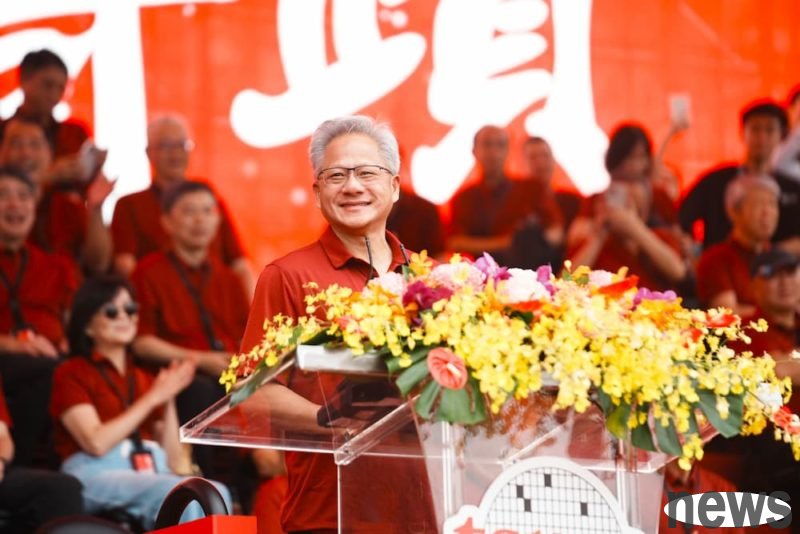NVIDIA CEO Jen-Hsun Huang recently flew to Taiwan on a special plane and appeared to support the TSMC Games. He emphasized that AI is the most important technology of this era and the world should actively invest in its development. Taiwan's rol...

NVIDIA CEO Jen-Hsun Huang recently flew to Taiwan on a special plane and appeared to support the TSMC Games. He emphasized that AI is the most important technology of this era and the world should actively invest in its development. Taiwan's role as a global semiconductor manufacturing center is still very important. He asked TSMC Chairman Wei Zhejia for more chips, which was regarded by the outside world as a signal of an "escalating chip shortage."
According to estimates from the Industrial Research Institute, the global semiconductor market will reach US$700.9 billion in 2025, with an annual growth of 11.2%. Taiwan's AI-related applications will drive up the utilization rate of IC manufacturing and packaging and testing capacity. The annual output value is estimated to reach 6.3313 billion yuan, with an annual growth of 19.1%, showing strong momentum. With the high demand for AI applications and high-performance computing (HPC), the semiconductor technology and market will reach new heights.
Coincidentally, Drew Henry, president of the international business group of Arm, the global leader in chip design IP, visited Taiwan on November 5 and said that TSMC and MediaTek are the two most critical partners in the Arm ecosystem. Especially in promoting the popularization of AI technology, Taiwan's manufacturing and design capabilities play an indispensable role.
The current strong demand for AI-related products has led large technology companies such as Amazon, Google, Microsoft, and Apple to actively invest in self-developed chips in recent years. Liu Peizhen, director of the Industrial and Economic Database of the National Taiwan Institute of Economics, said that chips are regarded as the "new oil" in the 21st century. Whether it is AI, 5G, quantum computing, or advanced military technology, they are all highly dependent on cutting-edge chips made in Taiwan.
Liu Peizhen pointed out that TSMC currently controls the main manufacturing capabilities of the world's leading process chips, such as 3 nanometers and 2 nanometers. For 2 nanometers, the first bases for mass production in the second half of 2025 will be Hsinchu's Baoshan and Kaohsiung factories. The monthly production capacity will increase from 40,000 to 50,000 wafers in 2025 to 100,000 wafers in 2026. This indeed makes the global technology industry highly dependent on Taiwan.
Technology Island CEO Wang Zhijian pointed out that the current wave of AI and high-performance computing has indeed promoted the explosive growth of the semiconductor industry, but there are also structural worries hidden behind this boom. Although many new wafer fabs are in full swing in terms of hardware construction, they may face the phenomenon of "not having enough manpower to develop production capacity." If there is a lack of manpower and technology to undertake, over-expansion will lead to the risk of local bubbles.
Zhang Zhuankai, general manager of 1111 Human Resources Bank, said that according to the database, the average salary of a semiconductor engineer with a master's degree is 57,600 yuan one year after entering the industry, and the salary market for 3 to 5 years of work is 65,300 yuan. With more than 5 years of cumulative experience, the salary reaches 73,000 yuan, and they can also enjoy generous dividend bonuses and year-end bonuses.
Zhang Zhuankai emphasized that in recent years, the AI boom has driven a significant increase in semiconductor-related job vacancies in Taiwan. The demand for talents is mainly concentrated in parks such as Hsinchu, Tainan and Kaohsiung. The regional concentration effect is obvious, and the industry is facing a structural manpower bottleneck. In the future, in addition to increasing salaries, companies should actively invest in workplace training and industry-university cooperation. Otherwise, semiconductor expansion will face the pressure of "abundance of capital and shortage of talents."
Further reading: Qihongdeng ranks sixth among the top 100 foreign investors! AI job openings grow 9.3% year-on-year, maintaining "asking for help" as bargaining chip Zhiyun Technology steps into information security and will capture more than half of the market by 2028! Alliance with Weibi and Beixiang to launch "Information Security Education Center" Enterprise-level AI Agent intelligent system! Uni-President Information launches AI response robot platform LumineOne